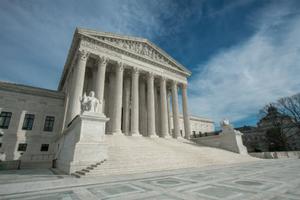On Campus
Can the Supreme Court Confirmation Process Be Saved?

American University's Sine Institute of Policy & Politics Fellow Ruth Marcus, a columnist for The Washington Post, moderated a lively debate about the Supreme Court nomination process with Ed Whelan of the Ethics and Public Policy Center and Caroline Fredrickson of the American Constitution Society at American University earlier this month.
The speakers discussed the controversy over the Senate’s refusal to vote on Merrick Garland, Brett Kavanaugh’s hearings, and filibusters to block nominations. Marcus, who is on leave from The Washington Post and writing a book about the Kavanaugh process, is a fellow at AU this semester.
News that the U.S. Senate changed its rule to limit debate on nominations after cloture from 30 hours to two hours met with mixed reaction from the guests.
“It’s an outrage after an outrage,” said Frederickson, of the ACS, a leading progressive legal organization. "Compressing the time to consider lifetime appointments and abandoning other long-standing traditions that help vet nominees are 'very disturbing' trends since the election of President Trump."
Whelan argued the post-cloture debate only applies to district judges and it was restored norms. “In the grand scheme it’s trivial,” he said.
"The Republicans aren’t the only ones who have changed the rules," said Whelan. "Democrats were the first to use the so-called 'nuclear' option in 2013 to eliminate the 60-vote Senate threshold need for executive branch and federal judicial nominations."
Whelan maintained that Trump nominees have had superb ratings from the American Bar Association.
"The intensive fights over nominees reflect the deep divide between judicial philosophies of how to interpret the Constitution," said Whelan. “This is ultimately a process that the framers understood would be shaped by politics for better or worse."
Frederickson suggested Democratic presidents have been less likely than Republican presidents to nominate ideological judges.
"Court nominations garner so much attention because there is a lot at stake," said Frederickson. “The conservative legal movement has been more embedded in the political process, and the courts are trending rightward."
Whelan disagreed with that assessment. He suggested Democrats’ concern over diversity — making sure there is gender and ethnic balance in the courts — has slowed down and complicated the process. Whelan said that conservatives are not ready to declare victory, and the right-leaning Supreme Court majority could shift if a Democrat is elected in 2020.
Frederickson said that she was troubled with the changes in the court and decisions that are suppressing votes of minorities.
“This is a nation that is transforming — demographically and ideologically — going in a direction that will be out of step with the Supreme Court,” said Frederickson. “It’s a dangerous paradigm for democracy when the courts are out of sync with voters.”
Despite the current polarization, Marcus noted that there have been moderate Supreme Court nominees, such as Ruth Bader Ginsberg, who garnered bipartisan support. There was a time in American history when hearings were not held before the Senate voted on nominees, and the question was raised as to whether that should be the tradition again.
“Having a Supreme Court hearing is the worst possible thing, except for the alternative,” Marcus said. “Even with the limitations in a hearing, you do have the opportunity to get some sense of a nominee, his or her worldview, judicial philosophy, and knowledge of the law. I think it would be terrible if we simply gave up on that.”

